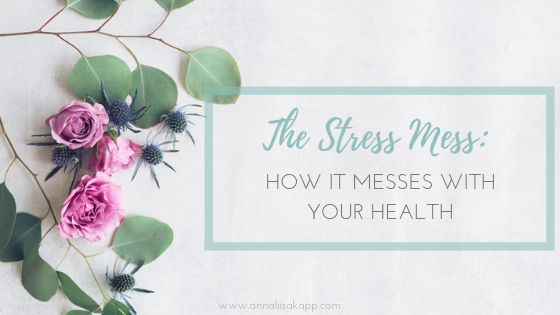
.
We all have some level of stress, right?
It may be temporary (acute), or long-term (chronic).
Acute stress usually won’t mess with your health too much. It is your body’s natural reaction to circumstances, and can even beneficial and life-saving.
Then, when the “threat” (a.k.a. “stressor”) is gone, the reaction subsides, and all is well.
It’s the chronic stress that’s a problem. You see, your body has specific stress reactions. If these stress reactions are triggered every day or many times a day that can mess with your health.
Stress (and stress hormones) can have a huge impact on your health.
Let’s dive into the “stress mess.”
.
Mess #1 – Increased risk of heart disease and diabetes
Why save the best for last? Anything that increases the risk for heart disease and diabetes (both serious, chronic conditions) needs to be discussed.
Stress increased the risk for heart disease and diabetes by promoting chronic inflammation, affecting your blood “thickness,” as well as how well your cells respond to insulin.
.
Mess #2 – Immunity
Did you notice that you get sick more often when you’re stressed? Maybe you get colds, cold sores, or even the flu more frequently when you are stressed?
Well, that’s because stress hormones affect the chemical messengers (cytokines) secreted by immune cells consequently, they are less able to do their jobs effectively.
Mess #3 – “Leaky Gut.”
Stress can contribute to leaky gut, otherwise known as “intestinal permeability.” These “leaks” can then allow partially digested food, bacteria or other things to be absorbed into your body.
The stress hormone cortisol can open up tiny holes by loosening the grip your digestive cells have to each other.
Picture this: Have you ever played “red rover?” It’s where a row of children hold hands while one runs at them to try to break through. Think of those hands as the junctions between cells. When they get loose, they allow things to get in that should be passing right though. Cortisol (produced in excess in chronic stress) is a strong player in red rover!
Mess #4 – Sleep Disruption
Stress and sleep go hand-in-hand, wouldn’t you agree? It’s often difficult to sleep when you have very important (and stressful) things on your mind. This is because cortisol interrupts melatonin production, which is a hormone needed for REM sleep. And when you don’t get enough sleep, it affects your energy level, memory, ability to think, cravings, and mood. More and more research is showing just how important sleep is for your health. Not enough sleep (and too much stress) aren’t doing you any favours.
Mess #5 – Weight Loss Resistance
Chronic stress causes weight loss resistance for several reasons, some already mentioned above, such as poor sleep and insulin resistance. What’s more, the stress hormone cortisol influences out thyroid function, as it prevents the conversion of T4 (inactive) to T3 (active) hormone and increases thyroid resistance, meaning your cells can’t utilize thyroid properly even if you have enough thyroid hormone. This influences our ability to have a strong metabolism and convert food into energy. When cortisol levels are out of balance, we have an increase in blood sugar, which is converted from protein stores. This results in the loss of muscle (lean body mass) and in increase in body fat, especially around the mid-section.
Stress-busting tips
Reducing stressors in your life is an obvious first step.
Can you:
- Put less pressure on yourself?
- Ask for help?
- Say “no”?
- Delegate to someone else?
- Finally, make that decision?
No matter how hard you try, you won’t eliminate stress altogether. So, here are a few things you can try to help reduce its effect on you:
- Deep breathing – take 5 deep breaths counting to 4 as you inhale, counting to 5 when you exhale
- Meditation – if you’re new and feel intimidated, try a guided meditation on iTunes or the Podcast app (I like Hay House Meditations)
- Walk in nature – being around trees is especially helpful for reducing stress hormones
- Unplug (read a book, take a bath)
- Exercise (yoga, tai chi, etc.)
- Connect with loved ones
- Journal – try a brain dump (writing in a journal for 5 minutes without intention). This is really helpful if you can’t fall asleep
- Try adaptogenic herbs like Ashwagandha, Magnesium or activated B vitamins.
Conclusion
Stress is a huge and often underappreciated factor in our health. It can impact your physical body much more than you might realize.
Stress has been shown to increase the risk for heart disease and diabetes, affect your immune system, digestion and sleep.
There are things you can do to both reduce stressors and also to improve your response to it.
You can ditch that stress mess – commit to doing one thing today to help you cope with stress in a healthy way.
Would you like to build your stress resilience?
As you learn to activate your healing nervous system & turn off the fight, flight, and freeze mode, you will notice:
- More resilient immune system
- Ability to respond rather than react to stressors
- Feel more peaceful & calm
- Tap into your creativity more
- Solve mystery hormonal symptoms
- Activate a strong metabolism
- Feel focused & productive
- Sleep well and wake up rested
- Enjoy all day energy
To help you get started, join our action oriented workshop and have access to all the resources to build stress resilience. Click here to get all the details and sign up: Stress Resilience






